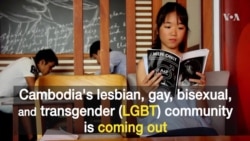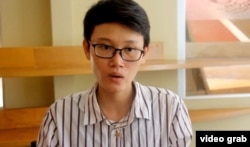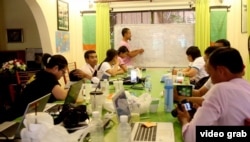Cambodia's lesbian, gay, bisexual and transgender (LGBT) community is coming out with an assertion of unprecedented pride, in stark contrast to just five years ago when discrimination and bullying were usually endured in private.
Gay groups have formed non-governmental organizations (NGOs) and the pink economy is proving lucrative for LGBT-friendly bars and coffee shops opening around town, alongside a fledgling gay media and entertainment industry.
Q Cambodia
Cambodia's first gay magazine, Q Cambodia, recently celebrated its second anniversary with Sorel Thongvan -- who was raised in Paris by Cambodian parents and worked for fashion labels Giorgio Armani and Alexander McQueen – as editor-in-chief.
The magazine is focused on gay friendly businesses in Phnom Penh, like the Feel Good Cafe II, and others in Siem Reap, Battambang and Kep, with frank discussions about homosexuality and the fears that are too often associated with that.
“Our cafe is not focused on gay or lesbian. The most important aspect is the quality of work. They need to be punctual. We work like a family and have fun,” said Chhay Bola, 23, a senior barista at Feel Good Cafe II.
“Customers keep coming in knowing that we have gay staff. It is not like they are going to say this coffee shop has gay people and you should not come. So I don't feel discriminate at all.”
Prejudices persists
Q Cambodia is also marketed for people like Long Malen, a lesbian and senior at the university majoring in law, who had a tough time with her family once they discovered her sexual orientation.
“One day, I had a meeting with my parents and they asked whether I was attracted to boys or girls? I said my inner feeling is as a boy and I that I am attracted to girls,” she said. “My parents then told me to choose; do want your family or do you prefer being who you are?”
Long Malen, who prefers to dress as a man, began promoting LGBT rights and then left home.
“People always look at the negative side of the LGBT community. It is fair to show their positive side too, and their commitment and their abilities. Moreover, if they can get the support they need from their family they can become a better person, a good student, get a job and help the family,” she said.
“I believe that what we are doing now can definitely make a change. We want to change the mindset rather than changing just people's behavior,” said Srun Srorn, founder of the group Rainbow Community Kampuchea (RoCK).
Traditional barriers
As a conservative country, Cambodians have traditionally viewed LGBT practices as being against nature and a threat to rebuilding of the social order in the aftermath of 30 years of war which left this country's social fabric in tatters.
Many faced abuse and discrimination at home, in school, and in the workplace. Some were rejected by their families or pressured into a conventional marriage where they struggled with their sexual identity. Others were locked-up in their village homes.
Srun Srorn said reports of human rights violations and discrimination were often low because many LGBTs preferred to keep their sexual orientation a secret rather than complain to the authorities. But he said that has changed with the number of people who are openly gay increasing significantly over the last five years.
“The number of violations, both physical and mental, reported against them is now also high.” he said. “I think LGBT self-expression has improved and is now good. But human rights violations and depression caused by parents who think can they take a gay child to a village sorcerer to be “cured” – still exists.”
Royal approval
Overcoming traditional views was initially tackled by the late King Norodom Sihanouk. In 2004, he was widely applauded for lending his support to the LGBT community by coming out in favor of same sex marriage. It was a royal statement that has remained unchanged under current King Norodom Sihamoni.
Noun Sidara, coordinator of the Sexual Orientation and Gender Identity (SOGI) project, said the king’s support inspired LGBT activists to stand up and promote their rights for the first time.
“Because of the king’s speech in 2004, laws prohibiting gay marriage have been deleted. This has helped the LGBT community in dealing with prejudices. Although there are still no laws to protect LGBTs, this was a very positive sign,” Noun Sidara said.
They were tentative first steps, Srun Srorn said, which were helped along by the digital age and online communications, a Cambodian education system that has vastly improved in recent years and successful LGBTs – whether it's in business or life.
“Technology was the first factor. It helped LGBTs to come out into the open and show themselves for who they really are. I am referring to the young people who were born in the 1990s. They live in a technology-driven era that helps them to inter-connect with people around them,” he said.
Luke Hunt contributed to this report.










